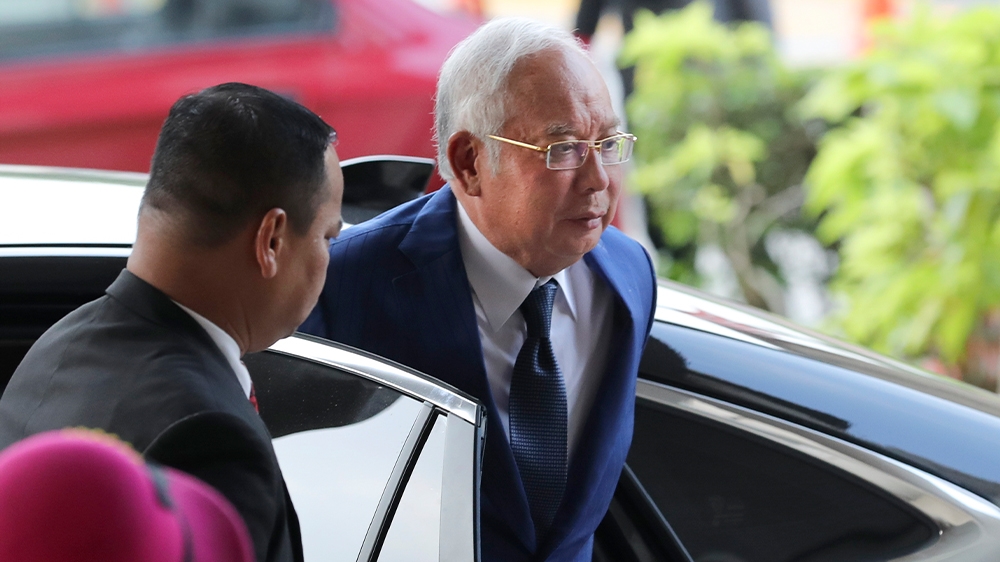Najib faces 1MDB verdict as Malaysian political ground shifts
Judge to give decision in first case relating to failed state fund in decision that could have a major political impact.

Kuala Lumpur, Malaysia – After nearly 16 months, dozens of witnesses and thousands of pages of evidence, a Malaysian judge will on Tuesday deliver his verdict on whether former Prime Minister Najib Razak is guilty of corruption in the first of a series of trials related to the alleged theft of billions of dollars from state fund 1MDB, in a decision that could have major political ramifications.
Najib faces seven charges in relation to SRC International, a unit of 1MDB, and allegations that millions of dollars ended up in his personal bank accounts and were used to shop at luxury stores, pay for home renovation projects and provide funding for the component parties of his then-ruling coalition.
Keep reading
list of 4 itemsA year since Pakistan’s May 9 riots: A timeline of political upheaval
Fiji’s former Prime Minister Frank Bainimarama jailed for a year
Candidates confront corruption and inequality in Panama’s presidential race
If found guilty, he could face decades in prison and substantial fines. He would also become the first Malaysian prime minister to be convicted in a criminal court.
“It’s a test for Muhyiddin’s [the current prime minister’s] government,” said Bridget Welsh, an expert on Malaysia and honorary research fellow with the University of Nottingham’s Asia Research Institute Malaysia. “It will also send a very important signal about whether leaders will be held to account for what they do while in office, as well as the penalties for elites abusing the system.”
Najib might be facing more than 40 charges in relation to 1MDB and spending most of his days in court, but he remains an influential figure in the United Malays National Organisation (UMNO), which was ousted in May 2018 amid popular anger about 1MDB, but is once again the biggest party in the coalition after Muhyiddin Yassin – the deputy Najib sacked over 1MDB – emerged as prime minister in March.
|
|
UMNO leaders were seen at court and hundreds of people turned out to show their support despite coronavirus restrictions, as Judge Mohd Nazlan Ghazali, who began his legal career at the Securities Commission and Malaysia’s biggest bank, began delivering his verdict at 10.20am (02:20 GMT).
‘Near-absolute power’
When the trial got under way on April 3 last year, then-Attorney General Tommy Thomas told the court that Najib, who sat on the dock’s wooden bench leaning against a plump cushion provided by an aide, had wielded “near-absolute power” as prime minister; a time when he was also finance minister.
The “highest trust” had been placed in Najib by the Malaysian people, Thomas noted.
The prosecution called scores of witnesses to buttress its case, including anti-corruption investigators, former Second Minister of Finance Ahmad Husni Hanadzlah and senior bankers at AmBank where Najib kept his personal accounts.
The defence, meanwhile, sought to show that Najib was not aware of the source of the funds and was misled by Penang-born financier Jho Low, a man notorious for blowing thousands of dollars on bottles of champagne and partying with celebrities and socialites. He is now a fugitive, and has denied wrongdoing.
Investigators in the United States have said $4.5bn was siphoned from 1MDB – where Najib chaired the board of advisers – through a complex web of shell companies before it was used to buy the trappings of the uber-rich, including luxury homes, an ocean-going yacht, and art by Picasso.
Najib himself took the witness stand in December, reading from a prepared statement that was nearly 250 pages long.
His defence team said they were convinced they have done enough.

“We are very confident in the defence and the outcome as well,” Muhammad Farhan Shafee, one of Najib’s team of lawyers, told Al Jazeera. “Enough doubt has been aroused during the proceedings, and that’s the burden of proof we have to meet.”
Optimism
Najib, who turned 67 last week, has oozed confidence throughout, and the change in government has reinvigorated his political profile.
Earlier this month, he joined campaigning for a state assembly seat in his east coast constituency, and last week got special permission from the court – initially denied – to attend Parliament to deliver a speech.
On social media, the former prime minister continues to pepper lighter fare on family – his cat Kiky makes regular appearances – with his views on political developments. Last week, he posted a video of himself surrounded by dozens of staff singing happy birthday to the man they dubbed “bossku” a reference to the online persona he crafted in the run-up to the trial.
On Tuesday night, in a Facebook posting ahead of the verdict he thanked people for their support, took potshots at the government that ousted him, and said he would appeal if found guilty,
“I want justice,” he wrote. “I want to clear my name.”
Some cases related to 1MDB have been settled without jail time being served.
Last week, Malaysia reached a $3.9bn deal with US investment bank Goldman Sachs to drop criminal charges over its role in the scandal, and in June withdrew money-laundering charges against Najib’s stepson Riza Aziz, who had been accused of using money diverted from 1MDB to fund the blockbuster movie the Wolf of Wall Street.
The film, starring Leonardo DiCaprio and directed by Martin Scorsese, was banned in Malaysia.
Riza’s production house had already paid a fine to the Department of Justice in the US, while the settlement with Malaysia came to just over $107m.
Away from 1MDB, other politicians forced to answer corruption allegations after the 2018 election have also had their cases dropped or settled, including the former chief minister of the Borneo state of Sabah.
“Since the change of government, there have been a number of rulings in favour of those who were prosecuted,” said Ross Tapsell, senior lecturer at the Australian National University’s College of Asia and the Pacific. “The trend seems to be towards softer rulings.”
The SRC decision is being handed down five years to the day that Najib fired Muhyiddin and four other ministers as the revelations about 1MDB snowballed. Muhyiddin was sacked as deputy prime minister and home minister while then-Attorney General Abdul Gani Patail, as well as the head of the Special Branch, were also removed from their positions.

Later, Muhyiddin joined forces with the opposition, which had united in a bid to remove Najib. In the 2018 polls, he campaigned alongside veteran leader Mahathir Mohamad and the Pakatan Harapan coalition, to call for a full investigation into 1MDB and an end to corruption.
“It would look very bad for the Muhyiddin government if Najib was let off, especially as Muhyiddin himself was sacked and campaigned on these corruption cases,” Tapsell said.
Divisions
Muhyiddin became prime minister in March, aligning himself with UMNO and the Islamic party PAS to form a conservative, Malay-nationalist administration, after the king was convinced that he had a majority in Parliament.
Still, while he was won plaudits for his effective control of the coronavirus pandemic in Malaysia, his coalition’s majority is wafer-thin.
Parliament did not sit until earlier this month – bar a single ceremonial day for the official opening – and a vote to remove the speaker who had taken on the job under the previous administration was secured by only two votes. Rumours of a snap election are rife.
“For Muhyiddin, a conviction would take away his absolutely most daunting rival – and would spare him from having to cooperate with a coalition-mate he has ripped apart previously,” said Meredith Weiss, professor of political science at the University at Albany. “At least as important, a conviction (especially one worded clearly enough to increase the odds of its holding up on appeal) would certify his government as opposing corruption.”

UMNO too has its problems, which could undermine the ruling coalition’s position.
A number of senior politicians, including leader Ahmad Zahid Hamidi, are on trial for corruption. If any of them are found guilty, and the decision is upheld on appeal, they will lose their seats in Parliament.
Najib himself was also ordered last week by a Kuala Lumpur court to pay a staggering 1.69 billion ringgit ($397.4m) in unpaid taxes for the period from 2011 to 2017.
When Najib was first charged over SRC, Thomas noted the case was one of the most straightforward involving 1MDB; a case that spans at least six countries and involves a complex money trail through numerous shell companies and far-flung tax havens.
There was “overwhelming evidence” against Najib, he said.
Many Malaysians, emboldened by the May election result – the first time UMNO had been defeated since independence – were eager for a conviction, but there were also die-hard supporters who refused to believe that the scion of one of the country’s most influential political families could be guilty of such a crime.
Najib’s supporters plan to gather outside the court on Tuesday.
“For many Malaysians, it would be nice if Najib Razak was convicted,” said Oh Ei Sun, a political analyst who once worked in Najib’s office. “People are worried about the economy and wider government policies. A conviction would be an antidote to what progressives see as the regression of the country.”